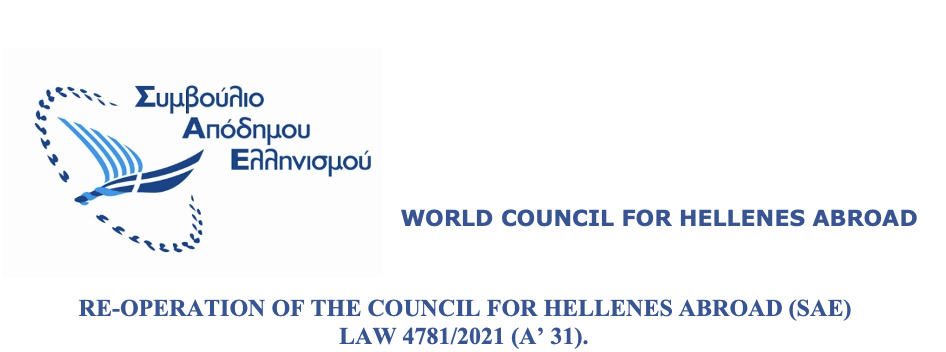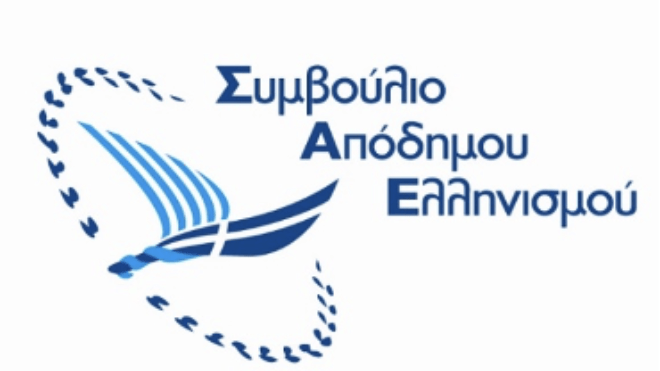
On 26/2/2021, the Parliament adopted Law 4781/2021 entitled “Organization and operation of the Ministry of Foreign Affairs, the World Council for Greeks abroad, settlement of issues of international development cooperation and humanitarian aid and other provisions”.
Articles 452-457 concern the re-operation of the Council for Hellenes abroad.
The World Council for Hellenes abroad (SAE), which is stipulated in par. 2 of article 108 of the Constitution and whose mission is the vocalization of all the Greek forces worldwide, will restart its operation in accordance with Law 4781/2021, as an advisory body of the Greek State on issues concerning the Greek diaspora and expatriates.
The objectives of the SAE are mainly:
a) the knowledge, preservation and promotion of the Greek language, the Greek culture and philhellenism,
b) the welfare, advancement and utilization of Greeks working outside Greece,
c) the reinforcement and the openness of the national and cultural identity of Hellenism,
d) the promotion of the interests of the Greek diaspora and the solicitation of investments,
e) the cementing of ties between Greeks in the world, namely relations between the diaspora and expatriates, as well as with the motherland.
STRUCTURE AND GOVERNANCE OF THE SAE
The structure of the SAE, on a central and regional level, is determined by internal processes which are conducted by the expatriates. Therefore, the organization is a bottom-up process and not the vice-versa as was the case until now.
More specifically, the government does not determine which organizations and how many people from each organization will participate in the Regional or General Assembly; the organizations themselves decide by internal processes its structure (self-organization).
The representatives of the expatriates per Region are elected by internal processes, which are conducted by the representative organizations and entities.
The key points to severing the umbilical cord between the organized expatriates and the Greek government-state are the following:
- The possibility of a wider representation of the expatriates beyond the already existing organizations which represent a very small percentage of the expatriates (approximately 4-5%), and therefore other non-organized collectivities-entities can be represented, namely scientists, artists, entrepreneurs, young people, but mostly the new generation of immigrants after 2010, which is not yet integrated in the existing expatriate organizations.
This addition was proposed by the official opposition and was submitted and approved by the Minister of Foreign Affairs, as an addition to paragraph 2 of article 453.
- The funds for the operation of the SAE are the product of self-financing and are not allocated from the state budget.
This is the point for which the SAE was criticized in previous periods as significant amounts from the ordinary budget were channeled, mainly, for the organization of large meetings and event in Thessaloniki and at the seat of the Regions, instead of actions in favor of the expatriates in various countries.
The Regions and the number of representatives at the SAE per Region were determined as follows:
a) Canada Region: Six (6) representatives,
b) USA Region: Ten (10) representatives,
c) Region of Central and South America countries: Five (5) representatives,
d) Region of European countries: Nine (9) representatives,
e) Region of Black Sea and Central Asia countries: Six (6) representatives,
f) Regions of Oceania – Eastern Asia countries: Nine (9) representatives,
g) Region of African – Middle Eastern countries: Five (5) representatives.
The SAE governing bodies are as follows: the Presidency, the General Assembly, known as “Commons” and other bodies, as stipulated in the Regulation on the Operation of the SAE.
The Presidency represents the SAE and fulfills the duties stipulated in the Regulation on the Operation of the SAE. The Regulation also determines the number, the composition and the election process for the member of the Presidency.
The General Assembly is the highest SAE governing body and fulfills the duties which are not assigned to another body by the Regulation on the Operation of the SAE.
The fifty (50) representatives of the Regions participate in the General Assembly as ordinary members.
The following also participate without a right of vote: Prominent expatriates (who excel in the state, scientific, business, technological, military, church, cultural and social sectors), philhellenes, representatives of the Ecumenical Patriarchate, of the Episcopal Sees and of the POMAK/PSEKA. They are selected by the Minister of Foreign Affairs following the counsel of the Presidency of the Special Permanent Committee of the Diaspora at the Greek Parliament.
COMPOSITION OF THE FIRST GENERAL ASSEMBLY
For the first composition of the General Assembly, at least thirty (30) members from at least four (4) Regions must be appointed and formally announced.
This fact is certified by the decision of the Special Permanent Committee of the Diaspora at the Greek Parliament, which has the authority to judge the representativity of the selection process, based on information submitted by the competent diplomatic and consular Authorities in case of doubt.
Within three months of this decision, the President of the Special Permanent Committee of the Diaspora at the Greek Parliament convenes the General Assembly.
During its first meeting, the General Assembly elects its President and decides on the Temporary Regulation pertaining to its Operation, until the official Regulation of the Operation of the SAE is adopted.
Last, the specific details for the implementation of the Composition, constitution and bodies of the SAE on a regional level and the convening of the General Assembly for the first time is determined by decree issued pursuant to the proposition of the Minister of Foreign Affairs and the counsel of the Special Permanent Committee of the Diaspora at the Greek Parliament. Following the constitution of the General Assembly, said presidential decree is amended pursuant to the proposition of the latter.
STEPS FOR THE CONSTITUTION OF THE REGIONAL ASSEMBLIES
The milestone for the official launch of the processes will be the date of publication of the Decree which is mentioned above.
However, because this could face delays for many reasons, it is important that the first steps begin now; such steps will become official at the appropriate moment.
- Persons from the wider democratic sector who are members of expatriate organizations (Board of Director members or simple members) and collectivities, Action Groups, Networks, etc. (entities), must start communicating with friends, acquaintances etc. per country, initially, and then per Region.
- To begin with, everyone must be informed of this new law and be motivated to proceed to a Regional organization, the drafting and approval of the regulation of operation, the objectives and the claims which are deemed necessary for each Region. (A draft regulation will be sent shortly)
- Organization of Regional meetings by teleconference.
- Election of the representatives of each Region for the General Assembly.
- It would be a positive development if the representatives were not the same as the ones from the previous SAE bodies of the 1995-2012 period, but young people with a desire for action.

